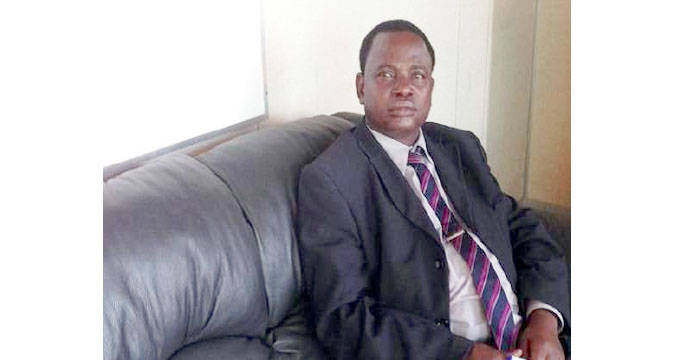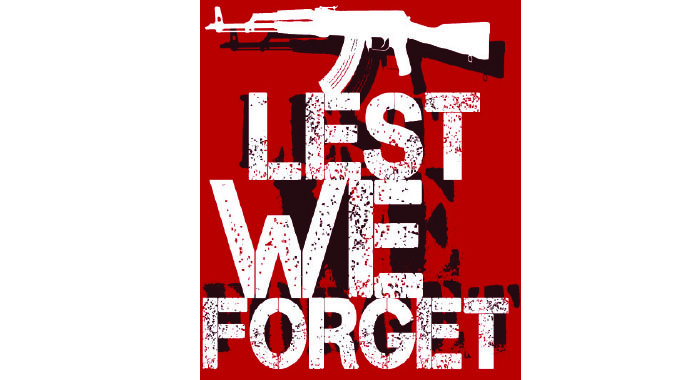
The Sunday News

THE office of the town clerk in any urban authority around the world is a prestigious one. Occupying that office in Bulawayo today is the 60-year-old Nkayi born, Christopher Dube pseudo name Cde Edmos Ngulube whom many might not be aware that at the age of 17, seized by the revolutionary spirit he walked all the way from Bulawayo to the border with Botswana to join the armed struggle.
The then young Dube was to become part of the second group of recruits to be trained in Angola and after independence he served in the Zimbabwe National Army (ZNA) until he left the military in 1994 for civilian service in Government. He was to leave the Government taking his talents to local authorities, Bulawayo and Victoria Falls.
It was in Victoria Falls where he was to land the office of town clerk and when a similar post became vacant in Bulawayo, the country’s second largest city, Retired Major Dube responded and landed the job following a rigorous interviewing process.

On Friday last week our Assistant Editor Mkhululi Sibanda (MS) had a conversation with Rtd Maj Dube whom many view as an outspoken figure and he did not disappoint. Rtd Maj Dube spoke honestly about his early upbringing that might have shaped his forthright character and when he started giving his account of the armed struggle he did not hold back.
He echoed the feeling of many ex-fighters, pointing out that there was an overwhelming feeling within the rank and file of Zipra, the Zapu military wing, that some commanders were selling out. Although maintaining that those were the feelings of the troops, he pulled out from his memory incidents which backed the suspicions that some commanders could no longer be trusted. Below are the excerpts of the interview.
MS: Generally you are known as the Town Clerk of Bulawayo, but who is Christopher Dube?
Rtd Maj Dube: I was born on 5 November 1960 in Nkayi District, Matabeleland North Province. I was born near Lutsha Primary School, which is about 37km from Nkayi Business Centre. My parents who are both late were Thole Solomon Dube who was my father while my mother was Thengeni Mpofu.
My parents were blessed with nine children, six boys, no, six men and three girls whom it would be fair to call them women now. As of my education I started my primary schooling at Lutsha in 1967 and completed it in 1973. From there I moved to Mpopoma High School in Bulawayo to start Form One in 1974. However, while in Form Two and working towards writing my Junior Certificate I could not proceed.
MS: What was the problem?
Rtd Maj Dube: I couldn’t go on with my schooling because I had become active in politics and the school authorities considered me a bad influence. I was then put under so much pressure that it was not possible to continue going to school, so I had to leave.
I was staying with my elder brother in Pelandaba commonly known as eNumber Six and my deputy headmaster at Mpopoma, Mr Poya was also a resident there. The headmaster of Mpopoma then was Mr Evans who after independence became the principal of Bulawayo Polytechnic. As for Pelandaba during that time it was also a hotbed of political defiance as there were a lot of political activities happening there. Remember it was also the place where the Zapu president, Dr Joshua Mqabuko Nkomo had his home.
The youths then, a majority of them were politically charged and I can tell you that it was difficult to move along the road between Dr Nkomo’s house and Induba Primary School. Youths were patrolling that road as part of providing security to the home of Dr Nkomo.
MS: How did your parents take it when you stopped going to school because of your political activities?
Rtd Maj Dube: They were angry and disappointed particularly my father who responded by sending me back to our rural home in Nkayi and that was during the second term of 1975. My father was working in the then Salisbury which is now Harare. Although I was sent back to the village as a form of punishment, six months later I was back in Bulawayo.
My elder brother had got me a job at Consolidated Textiles now National Blankets. That was in 1976. My job involved fringing heavy blankets (amajali). Yithi esasiphotha intshaka zamajali and there was no machine then. We were doing it manually. In the first and second week it was a painful exercise, izandla zazi sibabuhlungu and to make matters worse kwakusenziwa umgwazo. So if you failed to meet the target given one was fired on the spot. I soldiered on until January 1977 when I left to join the war.
MS: You did not encounter any problems at work?
Rtd Maj Dube: I had serious problems with the supervisor there, a man called Sibanda whom I met after the war esedriver umtshova. I had not relented on my political activities. At some point I spoke to a workmate, Petros Ndlovu about going to war and since he came from the Plumtree area we agreed that we will go together since he was familiar with the way to the border. I then confided in my uncle that soon I will be leaving for the war and he had no problems with that.
However, he said it was taboo for one going to war to bid people farewell as that could bring bad luck and even death. Nevertheless, I resigned from work on a Friday and the following day, Petros and I went to Renkini Long Distance Bus Terminus to board a Suka Sihambe bus to take us to Plumtree.
However, while we were still at Renkini, Petros said it would not be a good idea that we travel together as he had been told that there were roadblocks along the way, so if we were to be caught I would put him into trouble. I tried to calm him but he started crying and it was at that point that I decided to call off the journey. I returned home and by that time I was staying kobaba omncane eTshabalala.
MS: Now you out of your job, so what was the next move?
Rtd Maj: I did not tell anyone that I was no longer working but gave the impression that I was still going to work. I had been earning $5,77 per week and with other boys of my age staying kobaba omncane who were working, every Friday after getting paid we would put a dollar into a bottle which acted as our bank. Everyone was surprised the following Friday when I failed to bank like others.
Then on the second week on a Thursday afternoon I took all the money from the bottle and left Bulawayo on foot going towards Plumtree Town. The first night I spent it at Figtree and the second after Marula. I arrived in Plumtree Town on the third day and when I was looking around for a place to sleep, an elderly man urged me to continue with my journey as the border was no longer far away.
When I got at the border near Ramokgwebana I came across some girls who also urged me to continue and cross. I managed to do that without any incident. Little did I know that I was to meet those girls in Botswana as they were also going to join the war. From then I got a lift that took me to Francistown. I managed to find my way to a Zapu holding camp where I stayed for just a week. From Francistown we were flown to Zambia and out first port of call was Nampundwe Transit Camp.
MS: Take us through your stay at Nampundwe.
Rtd Maj Dube: We arrived at Nampundwe just ahead of pupils from Manama Mission. I was only 17 when I got there, so I was deemed still young to go for military training. Those below the age of 18 were called Minus Age or okijana, which meant children. Those of my age and below were supposed to be taken to school, but I told myself that I would not go to school. I had crossed the border to receive military training so that I could engage the Rhodesians in combat.
However, as fate would have it because I was deemed as somebody who had reasonable education being a Form Two I was given some chores by the commanders at the camp such as assisting othebula (guerillas) in documenting the newly arrivals. I was also chosen to be part of what was called a Crack Force Team. We were watching over others to see that comrades were observing rules of the camp. You know some recruits would sneak out of the camp or do other mischievous things so as the Crack Force that was what we were supposed to look out for.
If we caught you, you would then be subjected to some form of punishment depending on how serious your case was. Some were made to crawl and roll while for serious cases, the deviant ones were thrown into detention pits. The situation at Nampundwe was not easy. We lived under very difficult conditions and I was there for eight months.
MS: What made the situation difficult?
Rtd Maj Dube: There were food shortages and the regular diet was isitshwala and beans. I saw those beans at Nampundwe and I have never seen them again. I think those beans were some stockfeed. However, for us okijana the command element headed by Cde Killion gave us priority when it came to food. I think we were the only ones who were given breakfast in the form of the porridge, the rest had lunch kuphela.
You know also at Nampundwe besides the rigorous military drills, the recruits did not have adequate time to bath. When it was time to take a bath the recruits were taken to a nearby river and the instructors such uTeddy who was very notorious did not allow us to remove our clothes and bath. You will bath while clothed, that was the life at Nampundwe.
Teddy was the most notorious instructor there and there is no one who trained under Zipra who went through Nampundwe who does not know him. Unfortunately he is late now. However, there is another instructor, uBhokhwa who almost killed me.
MS: What had you done?
Rtd Maj Dube: We were doing the usual physical exercises and that day I was feeling dizzy. I was failing to keep pace with others and he thought I was being stubborn. I tried to explain to him that I was not feeling well, but he did not believe me. So he took a log and gave me a thorough beating. I thought the man was going to kill me.
n To be continued next week when Rtd Maj Dube takes us through his training in Angola under the Cubans and also reveals a controversial order from two members of the Zipra High Command who arrived at their camp, CGT2 in Zambia and ordered them to be disarmed, a move that riled up the troops as that was the day when the Freedom Camp (FC) and Mkushi came under heavy attack from the Rhodesian forces.



